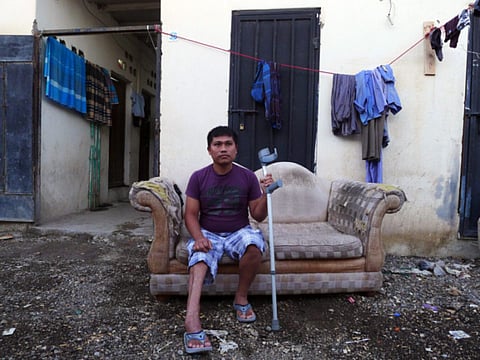Qatar vows to protect World Cup workers
Says setting clear guidelines from recruitment to repatriation

Doha: Qatar pledged Monday to ensure respect for labourers’ rights after Amnesty International urged the state to end the “alarming” abuse of migrants working on football World Cup infrastructure.
A 169-page Amnesty report called on world football governing body Fifa to press Qatar to improve labour conditions, alleging exploitation of the workers, mostly from South or Southeast Asia.
In response, the organising committee in Doha, which rejects claims of slavery-style conditions on construction sites in the world’s wealthiest nation per capita, pledged to impose respect for workers’ rights.
The Qatar 2022 Supreme Committee (Q22) said it had held “constructive” talks with Amnesty on Sunday on the conditions of foreign labourers, and that the dialogue would continue right up to the tournament.
A “Workers’ Welfare Standards” setting clear guidelines from recruitment to repatriation is to be issued at the end of this year, it said in a statement.
It stressed that compliance would be a contractual obligation for companies working on Q22 projects and would be robustly monitored.
In a report, however, Amnesty said its researchers had heard one construction firm manager use the term “animals” to describe migrant workers.
Amnesty secretary-general Salil Shetty said the findings indicated “an alarming level of exploitation” in Qatar, and called the abuses “widespread” and “not isolated”.
“Fifa has a duty to send a strong public message that it will not tolerate human rights abuses on construction projects related to the World Cup,” he said.
After meeting Qatar’s emir and prime minister on November 9 in Doha, Fifa chief Sepp Blatter said the issue of working conditions was being addressed.
On Monday, Fifa said human rights must be respected.
“Fifa has made very clear... that it upholds respect for human rights and the application of international norms of behaviour as a principle and part of all our activities,” it said.
It said that it understood and shared Amnesty’s efforts to ensure justice and respect for rights, adding it expects “the hosts of its competitions fully respect these”.
German trade union chief Michael Sommer, meanwhile, called for Fifa to pull the World Cup from Qatar unless the country improves conditions of migrant workers.
“We urge an immediate end to forced labour conditions or the World Cup be withdrawn from Qatar,” said the president of the Federation of German Trade Unions (DGB), Michael Sommer.
And a South Asian rights group called for a boycott of the tournament in Qatar.
The preparations provide “an opportunity to expose the treatment of migrant workers by a rich nation”, said Suhas Chakma, director of the New Delhi-based Asian Centre for Human Rights.
Chakma said countries which support human rights “should boycott the event”.
‘Onus’ on Qatar to protect workers
Shetty said Amnesty had met Qatari officials who were “very willing to recognise that there is a problem and... strongly oriented to find solutions”.
A foreign ministry source in Doha said the authorities had “asked international law firm DLA Piper to include the Amnesty report... in the independent review it is carrying out concerning the conditions of foreign labour”.
Amnesty’s report documented several abuses, including “non-payment of wages, harsh and dangerous working conditions, and shocking standards of accommodation”.
Shetty said: “It is simply inexcusable in one of the richest countries in the world that so many migrant workers are being ruthlessly exploited, deprived of their pay and left struggling to survive.”
Amnesty cited a Doha hospital representative as saying that “more than 1,000 people were admitted to the trauma unit in 2012 [after] having fallen from height at work”.
Some 10 per cent became disabled and “the mortality rate was ‘significant’.”



